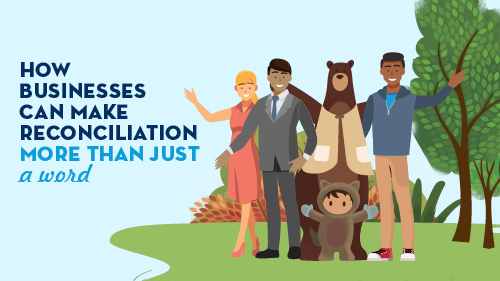In 1991, the report from the Royal Commission into Aboriginal Deaths in Custody was tabled. This was a time of growing awareness about the numerous challenges — social, political and economic — faced by Aboriginal and Torres Strait Islander individuals in Australia.
It was also the start of an ongoing shift to create positive change. That year, the Council for Aboriginal Reconciliation was established, and the following year the landmark Mabo vs Queensland case went to the High Court, bringing recognition of native title.
In the three decades since, reconciliatory progress has been made, but it has mostly been slow and often interspersed with periods of inaction. Opportunities for employment and economic participation, as well as celebration of culture, are critical for ensuring Aboriginal and Torres Strait Islander people can pursue their ambitions, tell their stories and have their voices heard.
One group pursuing these goals is the Salesforce equality group WINDforce, a community representing a Worldwide Indigenous Network of Diversity, was formed. The work of WINDforce covers education, engagement, collaboration and knowledge sharing, with the aim of respecting and celebrating Indigenous people and their cultures around the world.
In line with the goal of National Reconciliation Week 2021 (which runs 27 May to 3 June), WINDforce seeks real, measurable and practical outcomes, rather than just words. Those outcomes include self-determination, truth-telling, technological advancement and contribution to the wider economy. These ambitious goals will only be achieved if the business community gets on board.
How exactly does a business get on board? There are numerous ways, but as with everything else in business, it should begin with a clearly communicated plan.
What’s the RAP?
The WINDforce team at Salesforce Australia, in collaboration with leaders from across all areas of the business and external stakeholders, is in the process of developing a Reconciliation Action Plan (RAP). In developing this plan — a journey over several years — employees have explored the company’s history with reconciliation with stakeholders to inform Salesforce’s unique vision for reconciliation and develop a range of commitments, many of which are already in progress.
“It’s been incredibly important as we develop our first RAP, we are engaged with our broader stakeholders” says Rob Scambler, Senior Manager, Industries Solution Engineering at Salesforce, who has been involved with creating Salesforce’s RAP.
“Firstly, to create awareness through a process of reflection. We have strived to ensure our internal stakeholders are aware of the importance of engaging customers, alliance partners and our local communities in developing our RAP. Our local leadership team has really taken this on board and been incredibly supportive in driving this.
“And secondly, to challenge all employees to take meaningful action. We are focused on developing a RAP that represents an all-of-business plan, aligned to our V2MOM. Only then will our business be able to achieve maximum impact in terms of developing and strengthening relationships with Aboriginal and Torres Strait Islander peoples, engaging employees and stakeholders, and empowering Aboriginal and Torres Strait Islander peoples in line with our unique vision.”
How can businesses be springboards for reconciliation?
For every 10 Aboriginal and Torres Strait Islander students that begin a university degree, only four will graduate, says Adam Davids, Director of Learning at CareerTrackers.
At the same time, the Human Rights Commission reported that of the people holding the 2,490 most senior career posts in Australia, just 0.4% have an Indigenous background. This is despite 3% of Australia’s population having an Aboriginal or Torres Strait Islander (Indigenous) background.
“Clearly there is under-representation of Indigenous Australians in the C-suite, and it’s our goal to change that,” Adam says.
“So we go to campuses and meet with students to learn more about their career passion and match them to an organisation where there’s a potential long-term fit.
“We’ll deliver professional development and leadership training for the students, with the goal of them completing a paid internship every university holiday throughout their degree. This way, they build the skills, networks and the confidence to graduate university, get into a professional job and kickstart their career.”
One such participant is proud Kamilaroi man Dooley Whitton, who became a full-time member of the Salesforce ANZ team this month after completing an internship. Dooley says CareerTrackers helped him kickstart his career.
“CareerTrackers provided me with an opportunity to get some hands-on real industry experience […] It was really nice to have a job that was going to benefit me in the long run,” he says.
Salesforce has partnered with CareerTrackers since 2018 through grants and technology support, as well as paid internship opportunities for students participating in the program.
The work being done by CareerTrackers is an excellent example of an organisation with a strategy that is backed up by specific action plans. It also clearly illustrates the many opportunities organisations have to become involved with and support Indigenous people well before they attempt to enter the workforce.
As Salesforce ANZ & ASEAN CEO Pip Marlow said recently, “businesses can be a powerful platform for positive change, but it’s also everyone’s responsibility to open more doors”.
Discover more about Salesforce’s core values and how we live them through Equality Groups like WINDForce here.
Want trailblazer tips and thought leadership straight to your inbox?


























